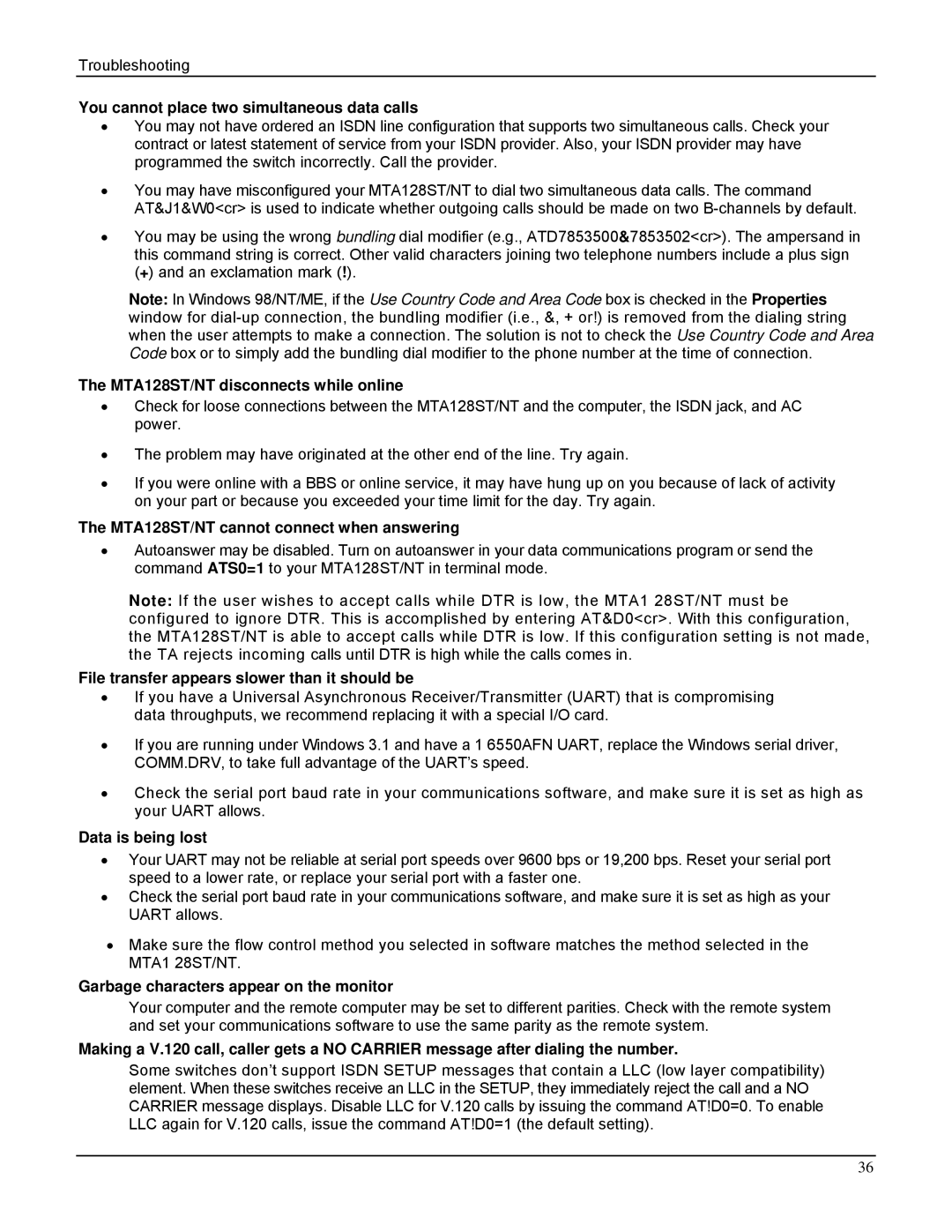
Troubleshooting
You cannot place two simultaneous data calls
•You may not have ordered an ISDN line configuration that supports two simultaneous calls. Check your contract or latest statement of service from your ISDN provider. Also, your ISDN provider may have programmed the switch incorrectly. Call the provider.
•You may have misconfigured your MTA128ST/NT to dial two simultaneous data calls. The command AT&J1&W0<cr> is used to indicate whether outgoing calls should be made on two
•You may be using the wrong bundling dial modifier (e.g., ATD7853500&7853502<cr>). The ampersand in this command string is correct. Other valid characters joining two telephone numbers include a plus sign (+) and an exclamation mark (!).
Note: In Windows 98/NT/ME, if the Use Country Code and Area Code box is checked in the Properties window for
The MTA128ST/NT disconnects while online
•Check for loose connections between the MTA128ST/NT and the computer, the ISDN jack, and AC power.
•The problem may have originated at the other end of the line. Try again.
•If you were online with a BBS or online service, it may have hung up on you because of lack of activity on your part or because you exceeded your time limit for the day. Try again.
The MTA128ST/NT cannot connect when answering
•Autoanswer may be disabled. Turn on autoanswer in your data communications program or send the command ATS0=1 to your MTA128ST/NT in terminal mode.
Note: If the user wishes to accept calls while DTR is low, the MTA1 28ST/NT must be configured to ignore DTR. This is accomplished by entering AT&D0<cr>. With this configuration, the MTA128ST/NT is able to accept calls while DTR is low. If this configuration setting is not made, the TA rejects incoming calls until DTR is high while the calls comes in.
File transfer appears slower than it should be
•If you have a Universal Asynchronous Receiver/Transmitter (UART) that is compromising data throughputs, we recommend replacing it with a special I/O card.
•If you are running under Windows 3.1 and have a 1 6550AFN UART, replace the Windows serial driver, COMM.DRV, to take full advantage of the UART’s speed.
•Check the serial port baud rate in your communications software, and make sure it is set as high as your UART allows.
Data is being lost
•Your UART may not be reliable at serial port speeds over 9600 bps or 19,200 bps. Reset your serial port speed to a lower rate, or replace your serial port with a faster one.
•Check the serial port baud rate in your communications software, and make sure it is set as high as your UART allows.
•Make sure the flow control method you selected in software matches the method selected in the MTA1 28ST/NT.
Garbage characters appear on the monitor
Your computer and the remote computer may be set to different parities. Check with the remote system and set your communications software to use the same parity as the remote system.
Making a V.120 call, caller gets a NO CARRIER message after dialing the number.
Some switches don’t support ISDN SETUP messages that contain a LLC (low layer compatibility) element. When these switches receive an LLC in the SETUP, they immediately reject the call and a NO CARRIER message displays. Disable LLC for V.120 calls by issuing the command AT!D0=0. To enable LLC again for V.120 calls, issue the command AT!D0=1 (the default setting).
36
